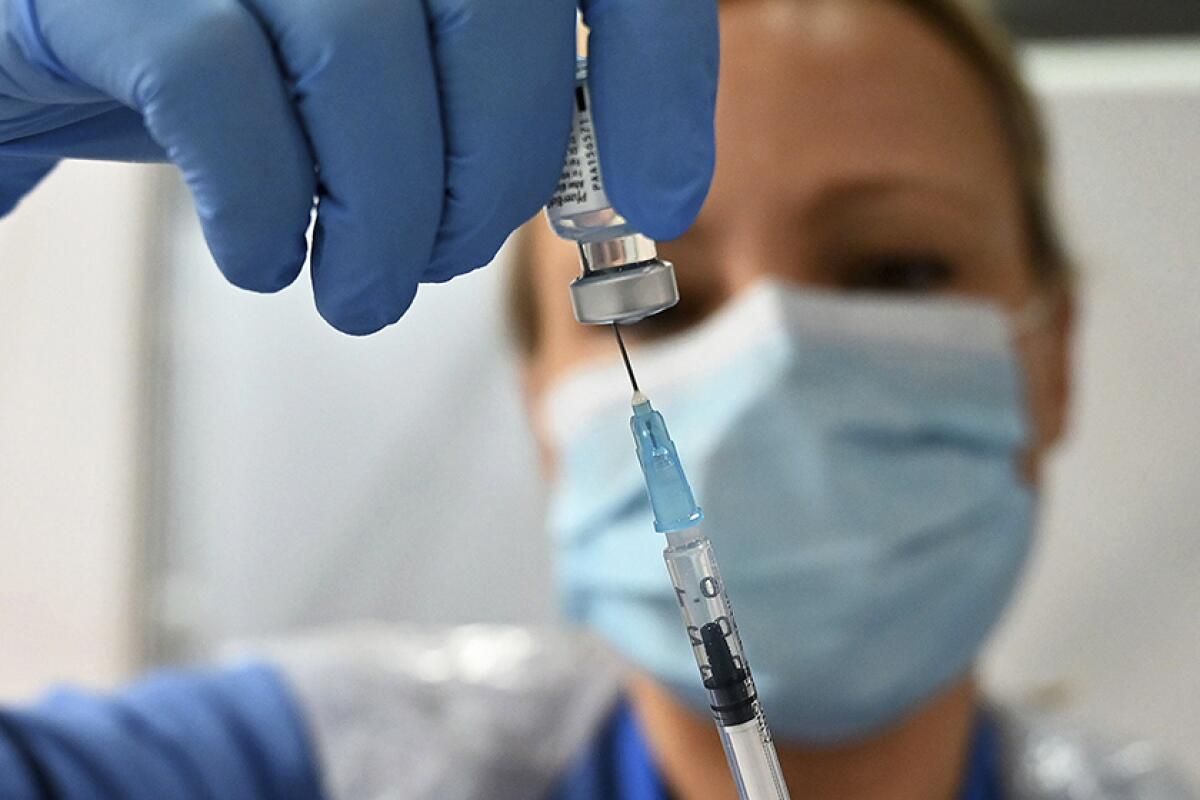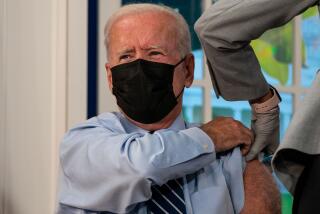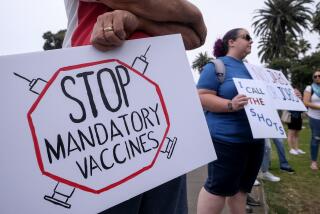Op-Ed: Doctors like me have a lot of anger at this new COVID-19 surge

- Share via
There was the muscled firefighter who said he was afraid of needles. And the newly pregnant patient who had worried that the vaccine would make her infertile. And the young man who had partied hard at a weekend bachelor getaway, then lied about his vaccination status to the check-in nurse when he turned up at the hospital.
Welcome to the new Pandemic of the Unvaccinated: the patients we love to hate.
Anger among front-line healthcare workers remains professionally hidden behind our masks and the oaths we swear to our patients and profession. We will continue to do our best for everyone who comes to the hospital. But that doesn’t stop the whispered grumbling outside exam rooms and in hallways as we gear up to care for our neighbors.
Again.
We are sick of this. You should be too.
We are back to indoor masking and six-foot distancing. Frustrated parents are having to cope with ever-changing back-to-school rules. Restaurateurs and airline and cruise ship executives hyperventilate while conservative governors posture and provoke.
And as our COVID culture wars drag on, the virus thrives, not caring whether you wear a trucker cap or knitted pussyhat.
There’s so much to be discouraged about — conspiracy theories, disinformation, Florida, Texas. But occasionally there’s also hope from unexpected quarters.
Alabama Gov. Kay Ivey, a Republican, is suddenly a heroine to those of us caring for unvaccinated COVID patients, calling out childish resistance like Grandma after a double bourbon: “What is it going to take to get people to get shots in arms? I don’t know — you tell me. Folks are supposed to have common sense. But it’s time to start blaming the unvaccinated folks, not the regular folks. It’s the unvaccinated folks that are letting us down.”
I love her. She speaks the truth. And perhaps because she’s not Fauci, some of the vaccine hesitant are listening. The daily rate of vaccinations recently tripled in her state.
Vaccine doubters gleefully point out that even the vaccinated have gotten the Delta variant, and that’s true — though in much smaller numbers than the unvaccinated. But for the most part, they aren’t the ones landing in the hospital — and 99% of those who have died recently didn’t get the shot. Vaccination remains our best weapon in this war.
There is no cure for COVID — just as there was no cure for smallpox and polio. But we’re rid of those scourges now: They were eradicated by vaccination campaigns. So if Gov. Ivey wants to continue to testify, the drinks are on me.
Even Lindsey Graham knows that his breakthrough COVID “would be far worse” without vaccination. He’s also been wearing a mask, so here’s a toast to you too, senator.
Right-leaning America, are you finally listening?
It’s hard not to be sympathetic to the very sick. The people I work with start from a desire to help, and our training encourages empathy over judgment. Blaming patients for their illness is terrible medicine: Once rung, that bell destroys access to essential history and confidence in the doctor, nurse, drug or procedure needed to cure or relieve suffering. That is why nurses discard disapproval with their soiled gloves, and why doctors sometimes cry in locked on-call rooms.
We know that anti-vaccine COVID patients suffer from this disease, and not just physically: In our sick patients, we see real anguish and regret for not getting vaccinated.
We see patients who are sick at heart explaining why they refused to take up a shield. Some of them cry, and regret is not merely a wistful sadness in someone who can’t breathe.
The very sick, those headed into the ICU, look terrified. The ”fake news” stories no longer seem so fake. And those of us treating the sick get no pleasure from their new insights. Watching it dawn on COVID deniers that this is deadly serious business turns out not to be much fun.
That and the sheer difficulty of the work ahead explains our anger.
In the part of the ER with the sickest patients, every one of them unvaccinated, we put on our poker faces, but the patients know by the way we move around them, by the pointed, frank discussions that happen when ventilators and oxygen tubing are rolled up to a bed. By the way a nurse holds a hand.
They’re frightened; we’re angry. And all of it could have been prevented by a free, safe shot.
It still can be.
This is important: Each case of COVID is a roll of the dice, a chance that a new variant might be created that kills children or defies all our vaccines and puts us back to the unthinkable: lockdowns, isolation and economic disaster.
We have to stop these surges.
In places like Los Angeles, where I work, enough people are vaccinated now that we are unlikely to run out of hospital beds during this surge. But with 11 million Californians still unprotected, even here we will suffer. Please be frightened, be angry, and if you are unvaccinated, please get that shot. Do it in secret if you need to. But protect yourself.
In places like Alabama, Arkansas, Georgia, Idaho, Louisiana, Mississippi, West Virginia and Wyoming, where less than 40% of people are vaccinated and hospitals are smaller, fewer and farther between, real trouble is looming. They could face the same kind of healthcare near-collapse that we saw in Italy and New York City last year.
But here’s more hope.
People there are hearing, finally, the sounds of this war growing closer. They are seeing friends getting sick, hearing from local hospitals and leaders like Gov. Ivey that the illusions provided by isolation and misinformation need to be discarded — like our frustrations at anti-vax excuses, they do not help fix the problem.
Vaccination rates are beginning to creep up even in places where such a thing seemed impossible a month ago.
So there is an opening, something to do other than seethe. If you know, as I do, friends or relatives back East or down South — or even just across the city or state — now is the time to reach out.
Now is a time to forgive, forget, encourage and coach our fellow citizens, an opportunity to open the minds of our friends and family and finally rid us of this virus.
Extend a hand, offer a ride, reassure a fear, make an appointment. Preventing that next variant might also prevent the death of someone you love.
Mark Morocco is a Los Angeles physician and professor of emergency medicine.
More to Read
A cure for the common opinion
Get thought-provoking perspectives with our weekly newsletter.
You may occasionally receive promotional content from the Los Angeles Times.










